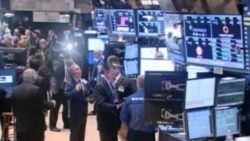Another social media giant is going public. Twitter, the online micro-blogging service, launches its initial public offering (IPO) of stock on the New York Stock Exchange Thursday. Interest in owning a slice of the popular social networking site has been high - helping to boost share prices nearly 25 percent higher ahead of its launch. But should you buy into the hype?
It’s the biggest technology IPO since Facebook. And if all goes as planned, Twitter could sell as many as 80 million shares priced between $23 to $25 apiece. That would generate about $2 billion, giving Twitter a market value of $14 billion. But is it really worth it?
Professor Aswath Damodaran at the Stern School of Business in New York says the numbers are just a starting point - based on what bankers think investors are willing to pay.
He spoke with VOA via Skype.
“They’re pricing Twitter based on what Facebook is trading for, and Linked-in is trading for. They’re not valuing the company. To value the company you’ve got to go back to basics: What are the revenues, what are the margins, what are the profits? I personally think from a valuation perspective that 23 to 25 is too high," said Damodaran.
Damodaran says that doesn’t mean investors won't make money. But unless you’re willing to monitor stock prices daily, he advises amateur investors to stay away.
“I’d say wait for Twitter to settle down. The first year or two after a company goes public, it’s really going to go through waves of momentum that are very difficult to forecast. So you have to make a decision whether you’re a trader or an investor," he said.
Part of the problem is that Twitter has yet to prove it can make a profit. And despite its large user base, it still lags behind other social networks, says market analyst Nate Elliott.
"According to our survey data, less than one-fourth of U.S. online users go to Twitter every month. It's not a bad number, but it's far behind what Facebook claims as active users in the U.S.," said Elliott.
The challenge for Twitter is not just how it expands but how it generates enough advertising revenue - without driving away 230 million users worldwide.
Whether Twitter can do that remains to be seen.
Facebook, which made its public debut amid intense hype last year, lost nearly half its value in the first four months. It’s now trading about 30 percent higher than when it first launched. Experts say Twitter could go through similar growing pains. So before you buy, wait for the dust to settle.
It’s the biggest technology IPO since Facebook. And if all goes as planned, Twitter could sell as many as 80 million shares priced between $23 to $25 apiece. That would generate about $2 billion, giving Twitter a market value of $14 billion. But is it really worth it?
Professor Aswath Damodaran at the Stern School of Business in New York says the numbers are just a starting point - based on what bankers think investors are willing to pay.
He spoke with VOA via Skype.
“They’re pricing Twitter based on what Facebook is trading for, and Linked-in is trading for. They’re not valuing the company. To value the company you’ve got to go back to basics: What are the revenues, what are the margins, what are the profits? I personally think from a valuation perspective that 23 to 25 is too high," said Damodaran.
Damodaran says that doesn’t mean investors won't make money. But unless you’re willing to monitor stock prices daily, he advises amateur investors to stay away.
“I’d say wait for Twitter to settle down. The first year or two after a company goes public, it’s really going to go through waves of momentum that are very difficult to forecast. So you have to make a decision whether you’re a trader or an investor," he said.
Part of the problem is that Twitter has yet to prove it can make a profit. And despite its large user base, it still lags behind other social networks, says market analyst Nate Elliott.
"According to our survey data, less than one-fourth of U.S. online users go to Twitter every month. It's not a bad number, but it's far behind what Facebook claims as active users in the U.S.," said Elliott.
The challenge for Twitter is not just how it expands but how it generates enough advertising revenue - without driving away 230 million users worldwide.
Whether Twitter can do that remains to be seen.
Facebook, which made its public debut amid intense hype last year, lost nearly half its value in the first four months. It’s now trading about 30 percent higher than when it first launched. Experts say Twitter could go through similar growing pains. So before you buy, wait for the dust to settle.





